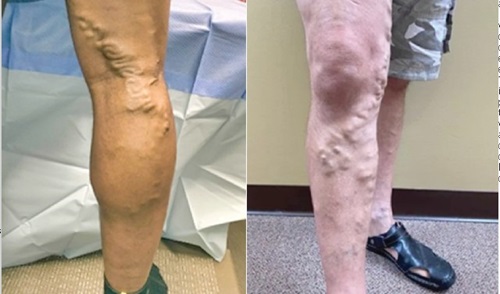
Are varicose veins life-threatening?
In life, some conditions can be cured, there are some we endure for life (chronic), there are some that are deadly while others appear deadly but are not. Still, there are some conditions we are born with while we acquire some due to our own lifestyle choices here on earth.
Advertisement
Whatever the conditions or diseases may be, it is important that we get in-depth education about them in terms of their causes, symptoms, prevention, treatment options and how to deal with them appropriately.
Many people have varicose veins while others have relatives and other loved ones who have varicose veins.
However, they do not have much information about the condition.
This article, thus, seeks to shed adequate light on varicose veins for public education.
I hope the article suffices for its chosen purpose.
Varicose Veins
Varicose veins are usually gnarled, enlarged and benign veins that appear on the legs and feet of people who have them.
However, varicose veins can equally appear in other body parts such as the gullet (oesophagus), uterus (womb), vagina, pelvis, rectum and scrotum.
Whenever varicose veins appear in the scrotum, they are called varicocele.
Varicose veins are also called varicoses.
They often twist and can bulge above the skin surface, and they appear blue, red or flesh-coloured.
They are usually noticeable and self-diagnosable, so lab tests or imaging are not required to detect them.
Once they appear on the legs and/or on the feet, they can last for years, or a lifetime.
Cause and Susceptibility
Causatively and mostly, varicose veins result when the small valves inside the veins stop working properly.
Blood usually flows smoothly from healthy veins to the heart.
Veins have one-way valves inside them that open and close to keep blood flowing towards the heart.
Varicose veins, thus, prevent the blood from flowing backwards through a series of tiny valves that open and close to let the blood circulate.
Once the valves are weakened or damaged, the blood flows backwards and collects in the vein, and eventually causes it to swell and enlarge (varicose).
Some predisposing factors of varicose veins are pregnancy, overweight, old age, gender, hereditary, long periods of standing and other known as well as unknown factors. Racially, more Caucasians (10 to 18 per cent) than Africans develop varicose veins.
Regarding susceptibility, women are more susceptible to varicose veins than men.
Empirical studies suggest that this may be because female hormones tend to relax the walls of veins, making the valves more prone to leaking.
Hormones are chemicals produced by the body.
Hormonal changes may be caused by pregnancy, premenstrual syndrome and menopause.
Symptoms
For many people, varicose veins have no symptoms apart from their conspicuous appearance on the legs and feet.
They are simply a cosmetic concern. In some cases, however, they cause aching pains and discomfort and sometimes, they constitute a signal for an underlying blood circulatory problem.
In others, veins may manifest in the form of swollen blood vessels in the skin or discolouration while bruises, heavy legs and itching may equally result from varicose veins.
At its early stages, some of the symptoms may be burning or throbbing in the legs, swollen ankles, muscle cramps in the legs and dry and itchy skin.
Some varicose veins put the affected person at risk for complications like blood clots or open sores on the legs.
Treatment and cure
Currently, varicose veins have no cure, even though they can be treated to minimise their appearance.
There are two main ways to get rid of varicose veins, namely sclerotherapy and vein ablation.
Sclerotherapy is a treatment that uses a chemical to damage the vein walls, causing the veins to close off and be reabsorbed by the body.
On the other hand, vein ablation uses heat or lasers to damage the veins.
Typically, varicose veins do not resolve on their own.
However, those that are pregnancy-induced usually vanish three weeks or a month after delivery.
Other treatment options or lifestyles required to improve blood circulation to minimise the discomfort of varicose veins are exercise, leg elevation and avoidance of soaking in hot baths for long periods.
Even though these and many other self-care tips are known preventive measures for the development of new varicose veins, they do not constitute a cure for the existing varicose veins.
The complications of varicose veins are rare but they can include painful skin ulcers near the varicose veins, blood clots and bleeding.
Largely, they are not considered a serious medical condition even though they cause pain and discomfort.
They equally affect social life, especially among people who are generally shy.
Conclusion
Varicose veins are not deadly, but they can affect a person’s physical appearance and cause serious discomfort, thereby putting the individual at risk for complications.
The physical, social and psychological effects of varicose veins can impact a person’s self-confidence negatively.
As indicated in this piece, varicose veins are attributed to various causative factors.
Even though there is no cure for varicose veins, they can be treated in varied ways.
Treatment of varicose veins may involve lifestyle changes or medical procedures with the chief goal of improving symptoms and appearance.
A person affected by varicose veins can recognise it.
Hence, there is no need to run lab tests or go for medical imaging to detect the availability of varicose veins.
It is only such veins appearing on the uterus that may not be easily visible to the affected person.
Conclusively, whether a health condition is deadly or not, we are encouraged to be educated about it.
Therefore, the impetus of this piece is to educate the public regarding varicose veins.
They are not deadly but can be discomforting and lead to certain complications.
The writer is a Hospital Administrator
Email: [email protected]




